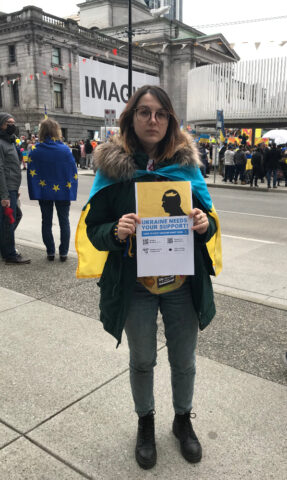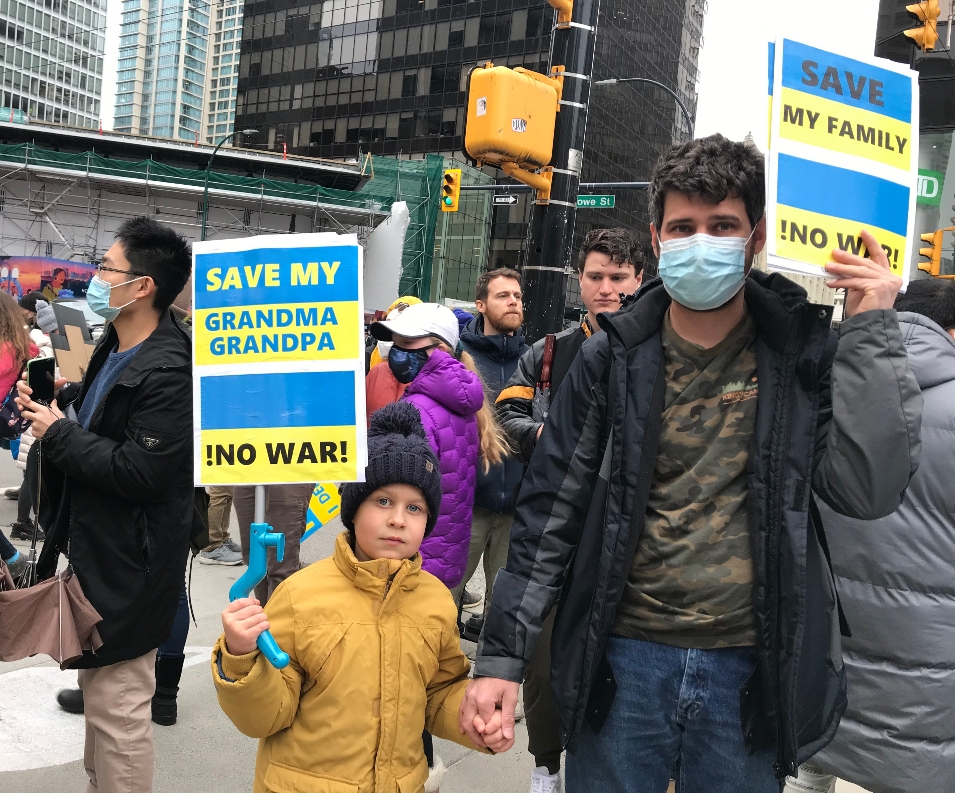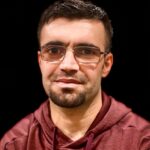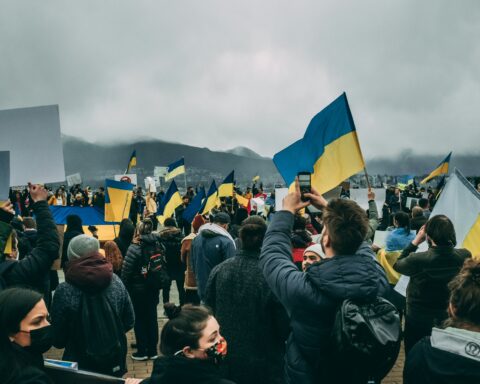Polina Kurchenko is one of more than 1.3 million Canadians of Ukrainian background. Like many of them, she has close family members in Ukraine, including in the besieged capital city of Kyiv, and worries about them daily.
After the Russian invasion, Kurchenko’s family back in Ukraine was forced to separate, she told New Canadian Media during a rally in solidarity with the people of Ukraine in downtown Vancouver on Feb. 26.
Kurchenko’s mother has fled to the border with Poland, while her 50-year-old father is a volunteer soldier, she says as she adjusts the Ukrainian flag tied around her shoulders. Her sister serves in the military as well, in another area of the country.
On the first day of the Russian invasion, Kurchenko says she could not sleep, as she only focused on her family and how to reunite with them. “I talk to them every now and then. They (would) like to come to Canada, and it’s my dream, but there is no way yet.”
More than two million Ukrainians have left their country to seek safety after the Russian military invasion ordered by President Vladimir Putin on Feb. 24, with over a half of them fleeing to Poland, the UN said on March 8. Many have also escaped to Hungary, Moldova, Romania and beyond.
Canada steps up to the plate
While Europe is dealing with what the UN refugee agency calls the fastest-growing refugee crisis on the continent since the Second World War, Canada has promised to help share the burden.

At a news conference called immediately after the invasion, Prime Minister Justine Trudeau announced that immigration applications of Ukrainians who want to come to Canada would be prioritized, and that there would be a phone line dedicated to urgent questions.
The announced measures include “prioritizing applications from people who currently live in Ukraine for: permanent residence, proof of citizenship, temporary residence, and citizenship grant for adoption.” Canada will also extend its temporary public policy that lets some visitors in Canada, including Ukrainians, apply for a work permit from within Canada.
A few days later, Immigration Minister Sean Fraser said Canada would be open to accepting an “unlimited number” of people who want to leave Ukraine and announced a new visa category that will allow Ukrainians to come to Canada for up to two years.
Fraser also announced the government would introduce an “expedited path” to permanent residency for Ukrainians with family in Canada.
Hoping for family reunification
Family reunification can’t come soon enough for Polina Kurchenko and other Ukrainian Canadians, but many are skeptical about the odds of that happening.
Leonel Dushin is a Canadian Ukrainian who lives in Vancouver. When he talked to NCM, his family was stuck in Kyiv, trying to survive the Russian bombardment.
“They are not safe in the city, and that makes me lose my mind. When there is bombarding, they run underground and stay for hours. I talk to them so often, but I am worried if they do not reply to me,” he said.
While Dushin is extremely upset about his family and country, he is also pessimistic about his family coming to Canada.
He says the promise of the Canadian federal government to bring Ukrainian refugees is great, but in practical terms “it’s pretty hard to bring people.”
“It’s my dream to bring my family here,” he adds.
‘It’s too dangerous if they leave home’
Hryhorii Tymoshenko is also one of the thousands of people who gathered in downtown Vancouver on Feb. 26 to express solidarity with the people in Ukraine. He came to the rally with his young son. As Tymoshenko told NCM, some of his family is in the northern city of Slavutych, and his parents live in Zaporizhian, in southeast Ukraine.
“My wife and my parents are safe because the areas are away from the war, but there’s no guarantee for their safety. I wish I could bring them here, but it’s too dangerous if they leave home.”
He says he appreciates the Canadian support to offer visas to Ukrainians, and he’s working to bring his family to Canada as soon as possible.
“I’d like to bring them here, but the condition is worse than we think. The Russian military could get them soon.”
The Russian military has been bombarding residential areas and targeting civilians. According to the most recent numbers verified by UN, 549 civilians have been killed so far, but the real figures could be considerably higher.
In the south-eastern city of Mariupol, more than 1,000 people were killed as bombs fell on residential houses and a children’s and maternity hospital, the city’s mayor, Sergiy Orlov, said Thursday.
Russia and Ukraine: a difficult history
The newest Russia-Ukraine crisis may be only in its 15th day, but it’s intense.
Ukraine became an independent country in 1991, after the collapse of the Soviet Union, but it remained a pro-Russia regime until 2013.
It was only when the former President Viktor Yanukovych rejected a deal for greater integration with the European Union that mass protests broke out, eventually toppling the pro-Russian government.
Russia retaliated by annexing Crimea in 2014 and supporting separatists in eastern Ukraine. The fighting in those regions caused mass internal displacement.
The newest catastrophe came after president Putin recognized two breakaway regions in eastern Ukraine as independent countries only to order a full-scale invasion of Ukraine a few days later.
Diary Marif is an Iraqi Kurdish journalist based in Vancouver, Canada. His writing has appeared in the Awene weekly, Livin, and on KNNC TV as a documentary researcher by the name Diary Khalid. Diary earned a master's degree in History from Pune University, in India, in 2013. He moved to Vancouver in 2017, where he has been focusing on nonfiction writing. He can be found on Twitter: @diary_khalid.






Putin is bringing in,Syrians in UKR
What is the Putin plan here ?
Using Arab Baathist fighters in UKR ?
Using the Chechens and the Arabs as the front line – with Russian forces 10-15 kms behind – providing drone,ART and Missile cover – is the plan.
BUT THAT IS NOT THE REAL STORY !
The aim is TO PIT MUSLIMS AGAINST CHRISTIANS in UKR – and then,there are bound to be massacres,beheadings,body mutilations,sacrilege and killings – and that will start the war of Islam Vs Western Christianity (minus Russia),and also,combined with food shortages in GCC,force GCC not TO OFFSET THE OIL EMBARGO ON RUSSIA ! dindooohindoo
The FACT is that the popular view in Arabia , is that the DESTRUCTION OF IRAQ and SYRIA, and the planned attack on Persia, is a conspiracy by the Christian WEST.THE TRUTH IS IRRELEVANT
So there will be many Arabs who will fight for Russia against US proxies in UKR – and there will be several Muslims in the West and GCC,who will fight against Russia,in UKR.